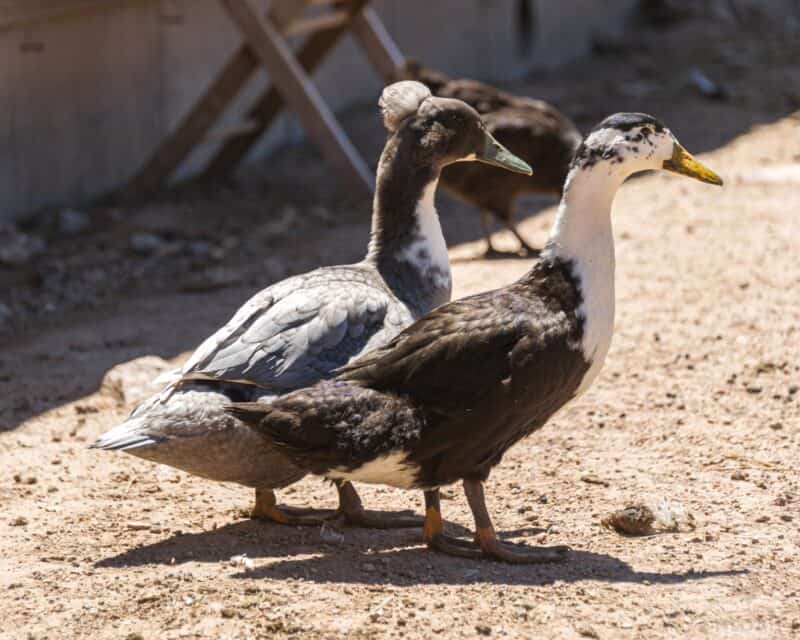Ask anyone who’s ever gone duck hunting, or even tried to photograph ducks, and they will tell you: these birds seem to have supreme eyesight. The slightest movement, even a little something out of place, and they will fly away. It’s amazing, but it can also be completely befuddling: how can any bird’s eyesight be so good?

It makes you wonder if their eyesight is better than ours. I guess we’ll have to compare if we want the answer, so let’s start with the basics. Can ducks see in color, or are they colorblind?
Yes, ducks can see color, and they have excellent color vision. Their vision is tetrachromatic, meaning they can see all the usual colors and also UV light.
Thanks to the revelations uncovered by avian biologists, we now know that ducks have incredible color vision, way better than anyone was expecting. In fact, their vision is so good it borders on unbelievable.
If you love ducks or just have an interest in them, this is stuff you’ll definitely want to know because it gives us just a glimpse into the amazing way that they can see the world. Keep reading and I’ll tell you all about it…
Ducks Actually See Color with Amazing Vibrancy
Beyond merely being able to see color, ducks can see colors in ways that you quite literally can’t even imagine.
To a duck, every color appears more vibrant, and they can detect variations of tone and shade and hue that would elude even the most delicately trained eye of the best human artist.
This gives them an advantage in their natural environment, being able to instantly detect anything that might be out of place. That amazing camouflage that a duck hunter invested in might quite literally stick out like a neon sign among the rest of the grass and reeds!
But, more than this, it makes the bright and colorful or contrasting plumage of other ducks truly remarkable to their eyes. As beautiful as they look to us, they’re incomparably beautiful and unique to their fellow ducks.

Can Ducks See All Colors?
Yes, they can, and they can even see colors beyond the usual red-green-blue spectrum that humans can detect.
As I mentioned above, every shade and tone of every color that you can think of, and a whole lot that you literally can’t imagine, ducks can see.
Ducks Have Tetrachromatic Vision, Allowing Them to See UV Light
Here’s where things get truly unreal. Ducks have tetrachromatic vision, compared to the trichromatic vision of people. Tetrachromatic means they can see additional colors that are in and near the ultraviolet range. Have you ever seen ultraviolet? I didn’t think so!
Ducks have four types of cones in their eye compared to our three, allowing them to see into the usual, full-color spectrum, ultraviolet as mentioned, and also an unknown spectrum that science still doesn’t understand.
This is due to the presence of what is known as a double cone among the other types, meaning that they might technically have five types of cones depending on how you look at it. Pardon that pun…
The ability to see UV light changes the way ducks see the world in such a way that they have a massive advantage over people and all predators. Let’s go back to that camouflaged hunter scenario I mentioned…
Let’s say, let’s just say, that a hunter was able to perfectly mimic the shape and color of the surrounding terrain with his camouflage. You have to admit, modern camo is pretty dang good!
Even if he could, a duck would still find this laughably inadequate because they can see the way that UV light plays on that surface and the material in a way that sticks out from the surrounding water and plant matter.
Those expensive and state-of-the-art decoys that you purchased? They glow like a neon sign to ducks.
Again, this remarkable eyesight extends beyond the detection of predators and irregularities in the environment: younger ducks, and the males and females, will reflect UV light differently, and this can inform a duck’s determination about the makeup of a flock or a fellow duck at a great distance.
Special Oil Ducts Protect Their Eyes from UV Damage at the Same Time
You might need some time to cope with all of these incredible facts, but we aren’t done yet when it comes to the singular miracle that’s a duck’s eye…
Their eyes also have special oil glands that secrete a natural substance that protects the delicate tissues of the eye from UV damage even as it allows the eye to detect UV light in the way described above.
How is it possible that it can filter the light to prevent damage while still allowing the cones to perceive it normally? I sure as heck don’t know, and I’m not convinced that science knows either at this point. Just one of the many mysteries still present in our natural world!
Ducks’ Eyes Also Have Extraordinary Sensitivity to Motion
Something else to know about duck vision is that they are veery sensitive to any kind of motion, and can detect it at a remarkable distance whether they are in flight, on land, or floating on the water.
Consider too that the reflective index of UV light on different surfaces, different materials, and so forth will also facilitate this visual detection. It is nearly impossible to sneak up on ducks for this reason.
All birds have remarkably good eyesight compared to most other animals, but ducks might have the best all-around vision of all!
Tom has lived and worked on farms and homesteads from the Carolinas to Kentucky and beyond. He is passionate about helping people prepare for tough times by embracing lifestyles of self-sufficiency.
